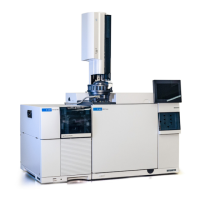5 Operating in CI Mode
To Monitor CI Mode High Vacuum Pressure
5977C GC/MSD Operating Manual 137
To Monitor CI Mode High Vacuum Pressure
Procedure
1 Start up and pumpdown the MSD. (See “To Pumpdown the MSD in CI
Mode” on page 120.)
2 In the Tune and Vacuum Control view select Turn Vacuum Gauge on/off
from the Vacuum menu.
3 In the Instrument Control view you can set up an MS Monitor for reading. The
vacuum can also be read on the LCP or from the Manual Tune screen.
The gauge controller will not turn on if the pressure in the MSD is above
approximately 8 × 10
-3
Torr. The gauge controller is calibrated for nitrogen, but all
pressures listed in this manual are for helium.
The largest influence on operating pressure is the carrier gas (column) flow.
Typical pressures for various helium carrier gas flows are approximate and vary
from instrument to instrument. (See Table 15 on page 138.)
Typical pressure readings
Use the G3397B Micro-Ion vacuum gauge. Note that the MFC is calibrated for
methane and the vacuum gauge is calibrated for nitrogen, so these
measurements are not accurate, but are intended as a guide to typical observed
readings. (See Table 15 on page 138.) They were taken with the following set of
conditions. Note that these are typical PCI temperatures:
If hydrogen is used as a carrier gas or JetClean system supply, the carrier and
JetClean system supply shutoff valves must be closed before turning off the
MSD power. If the foreline pump is off, hydrogen will accumulate in the MSD
and an explosion may occur. Read “Hydrogen Safety” on page 22 before
operating the MSD with hydrogen gas.
Source temperature 250 °C
Quad temperature 150 °C
GC/MSD Interface
temperature
280 °C
Helium carrier gas flow 1 mL/min

